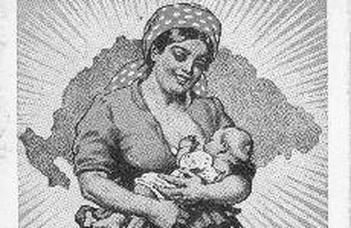Childbirth as border revision
Presentation by Ilona Kappanyos at the annual conference of the Hajnal István Society

Ilona Kappanyos' study examines how the perception of motherhood changed during the years of the First World War. The unprecedented, traumatic loss of life in the war intensified fears of the destruction of the nation - not just political or military, but demographic and biological destruction. On the one hand, it called for urgent public health and social reforms, and on the other, it led to the rise of eugenics. These two processes overlapped in many respects, as it was agreed that it was vital for the survival of the nation to maintain a healthy population and to have and keep a large number of healthy babies. The concept of 'national defence' in the decade of the decade covered a public health-social intervention bordering on eugenics, aimed at protecting the biological entity of the nation against health threats (venereal diseases, tuberculosis, infant mortality), balancing military losses at least to some extent by reducing infant mortality.
This context gave rise to the first modern attempts to protect mothers and infants and to care for the nation as a whole, most notably the Stefania Association, founded in 1915. From the Alliance's materials and from the texts of contemporary debates and discussions, a new discourse of motherhood emerges, vehemently asserting that childbirth is not simply an act of national empowerment, but of national protection, of national integrity, and that the mother's duty to protect the nation does not end with childbirth, but also includes the proper care of the infant (i.e., in accordance with the standards of the medical profession). After the Trianon Peace Treaty, the war discourse of motherhood was transformed into an even more clearly biopolitical discourse, since the defence of the country's territorial integrity became impossible, military and political means failed, and instead the defence of the nation-as-population remained, and infant protection and motherhood remained as a project of healing the wounds inflicted on the nation and of creating a successful irredentist future.
The institutionalisation of infant protection to strengthen the biological entity of the nation, and the new figure of the mother who protects the nation and at the same time needs to protect the nation, are the call to the profession of the midwife. The role of the midwife is to support and, at the same time, monitor the reproductive work of the mother. In Hungary, this profession was created in the context of national defence during the World War, and its professionalism has been shaped in every era by the medical directives of the time and the demographic needs of the system.

